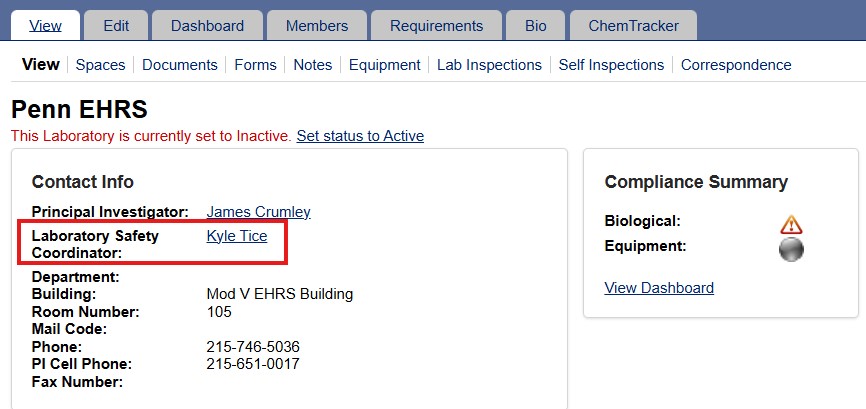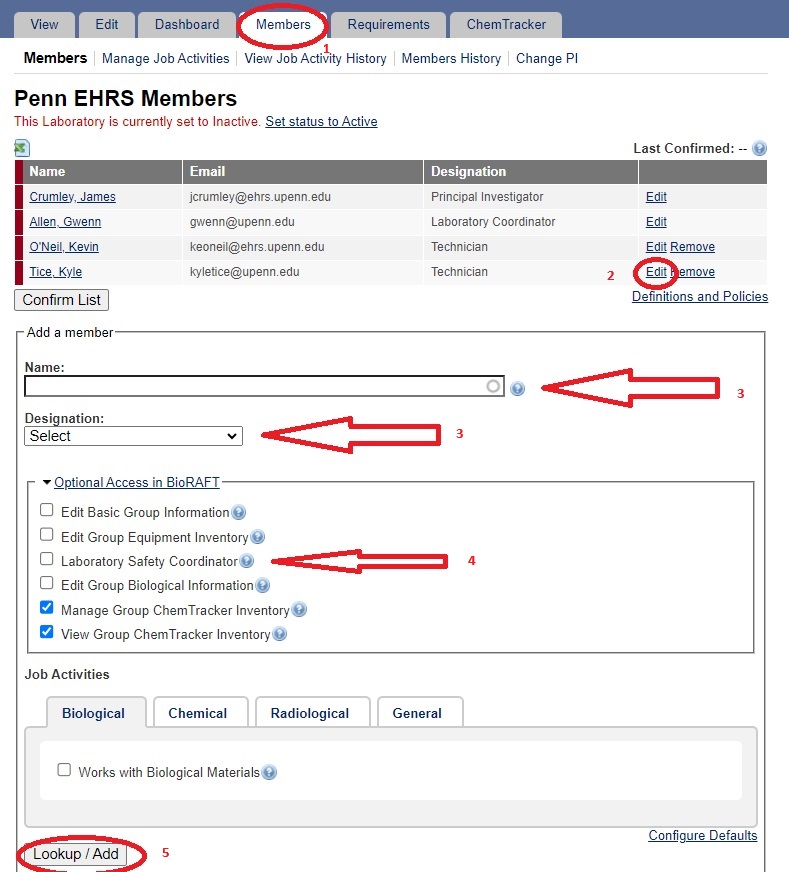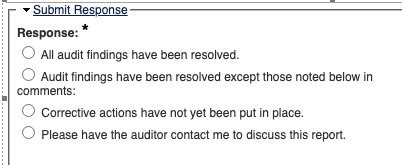Last Revised: March 05, 2025
Faculty in Penn research labs may designate one or more lab staff members to act on their behalf for issues involving laboratory safety. These individuals are called Lab Safety Coordinators (LSCs). Lab Safety Coordinators have full access to the lab record on BioRAFT, Penn’s online database for laboratory compliance. In many cases, the LSC is also the lab manager, though not always.
See below for more information.
- Serve as the main point person for communications from EHRS
- Manage BioRAFT account
- Model responsible lab safety conduct in your lab
- Set goals for lab safety in your lab
- Seek support of your PI for recurrent safety issues
- Delegate lab safety tasks among your lab members
- Discuss the role with outgoing and incoming lab safety coordinators
-
Overseeing basic lab information, including research focus and accuracy of spaces
-
Maintaining an up-to-date Lab Members List by adding or removing lab members as needed, including other members rotating in and out of the lab safety coordinator role
-
Completing the Biological Registration (if applicable)
-
Updating Lab’s Hazards List
-
Submitting Bloodborne Pathogens Exposure Control Plan (ECP) update (if applicable) on an annual basis or whenever changes occur in the lab, such as new lab members or location
-
Preparing for lab inspections by conducting/coordinating periodic laboratory self-inspections
-
Responding to lab inspection reports
Some labs have multiple lab safety coordinators; other labs have rotating lab safety coordinators. It’s important to keep this up to date for effective management of change during lab staff transitions. You can view your current lab safety coordinators by going to the landing page of your lab's BioRAFT profile:

Individuals cannot self-designate as LSC. Rather, PIs and existing LSCs can assign the role to others in their lab by following these steps: 1) Go to Members Tab, 2) click on the “Edit” link next to an existing member or 3) add a new lab member and their designation, 4) check the "Laboratory Safety Coordinator" box in the "Optional Access in BioRAFT" section, and 5) click the “Lookup / Add” button to add the user as a member of the group or click "Save" if an existing member. See below:

While the ultimate responsibility for lab culture lies with the PI of your lab, as LSC you play an important role in modeling responsible lab safety conduct and setting lab safety goals for your lab. Here are some ways in which you can achieve this:
- Facilitate timely resolutions (not just responses) to items described in lab inspection reports
- Discuss lab safety topics in group meetings
- Model and enforce that proper PPE be donned when working in the lab
- Encourage coworkers to reach out to EHRS, BAs, etc., for assistance and advice
- Promote routine lab cleanup days
- Highlight the importance and (personal) value in performing a risk assessment
“Lab Safety Coordinator (LSC) Training for Research Labs – EHRS” is now available on Workday Learning. This training provides LSCs with an overview of the roles and responsibilities associated with the lab safety coordinator position and other important guidance for your role, including lab safety training requirements and emergency information. While this is not a required training, EHRS feels both new and existing lab safety coordinators can benefit, and we encourage you to log on and self-assign via this link. The training takes approximately thirty minutes to complete.
General Information, Forms, Etc.
- Lab Coat, Gloves and Safety Eyewear Policy
- Laboratory Inspection Program
- Chemical Inventory Program
- Bloodborne Pathogens Exposure Control Plan (ECP)
- Laboratory Waste Disposal Guide
- Chemical Waste Pickup Form
- Notification of Lab Move or Closure webform
- Hazard Control Plan Templates
- Incident Reporting Forms - download a printable QR poster for University faculty, staff, and students reporting here!
- Emergency Info - download a printable Emergency, Injury, And Exposure Contract Information poster (Main Campus) and First Aid Guide for Medical Emergencies and post in your lab
- Workday Learning Selection Guide
- Assessing Lab Safety in Your Lab
- Requesting Signs and Labels (Including Inventory Barcode Stickers)
- Chemical Waste FAQs and Lab Safety Quick FAQs archive
- Safety Showers & Eyewashes Program
- Penn Green Labs
Navigating BioRAFT
- ChemTracker User's Guide
- BioRAFT Self-Inspections
- How to Check the Status of Your Lab's Bloodborne Pathogens Exposure Control Plan (ECP)
- How to Add or Remove Lab Members from Your BioRAFT Profile
- How to Complete the General Usage Biological Survey (Biological Registration)
- How to Certify the Lab Hazard Identification Survey
- Request Changes to BioRAFT Lab Locations (Spaces)
